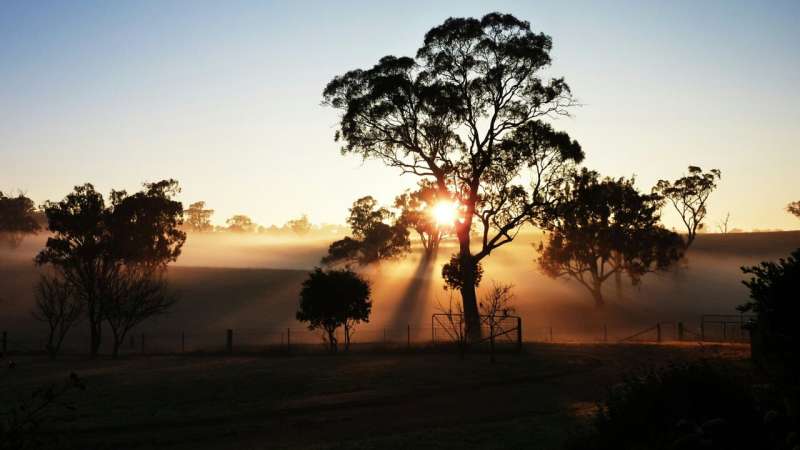
[ad_1]

Credit: Unsplash/CC0 Public Domain
Major environmental changes This means more Australians will face the difficult choice of whether to move home or take the risk of staying.
There are communities in the tropical north Losing residents Because these areas become hotter and more humid. Frequent floods Communities along the East Coast are questioning their future. Others face increasing bushfire threats that force them to bear weight. Difficult decision to move home.
However, K Decision making processes And migration opportunities are not the same for all. Factors such as socio-economic disadvantage and how we are connected to a place influence decisions to move or stay, where people go and how they experience their new place.
Our research, Edith Cowan is working with other researchers at the University. Center for people, place and planet and Curtin University, seeks to document when and why people live or move, and what that means for places and communities. Specifically, our research shows WHO The prospect of leaving can leave those who live there even more vulnerable.
We have been slow to adapt to the growing impact.
Climate change is global. There are compound effects. This is increasing the frequency and severity of disasters. Extreme weather events Like heat waves, fires, storms and floods. It is also accelerating environmental changes such as soil erosion, salinization of waterways, loss of biodiversity, and land and water degradation.
Both sudden interruptions and gradual widespread declines There are effects In the places where we live, work and play. So far, there is Less effective government action Improving Climate change adaptation in Australia.
As we have seen in recent times. LismoreNew South Wales, and Northern VictoriaFor example, living in some flood-prone areas will become Unaffordable due to insurance costs Or just uninsurable?
In other places, a variety of reasons will force residents to leave. This may be because climate change threatens their livelihoods, or they cannot tolerate new conditions such as longer heat waves or less reliable freshwater supplies. Others may not be able to bear the risk of another disaster.
All in all, living in the place they call home will not be sustainable.
What factors influence the decision to stay or go?
Not everyone can move to cooler or safer places. Systemic inequality means that some people are more vulnerable to climate change and have Low capacity Responding to others. This People at risk Children included (both Before and after birthWomen, old peoplepeople with low incomes and/or disabilities, people from Torres Strait Islanders and other cultural and/or linguistic minorities.
Also, housing is more affordable in warmer or flood prone areas. This makes people with less financial resources more likely to own or rent, increasing their disadvantage.
For First Nations people and communities, belonging and responsibilities to places (country) are intimately tied to identity. For them, Effects of climate changeColonization and resettlement interact, further complicating the question of displacement.
Keep the attachment-Emotional bonds between people and their environment -can suppress the urge to move. But climate change can fundamentally change the characteristics that make a place unique. What we once loved and enjoyed. Then it disappeared.
This kind of change Affects human health. And that results in feelings. Loss and grief. This can prompt people to decide to quit.
So who stays and who goes?
In our research, we found that when residents perceived a loss of value for Perth’s environment, it significantly increased their intention to move away and significantly decreased place attachment. They named bushland, coast, fauna and flora, and climate/weather as features they valued and feared to change or lose as climate change progresses. One study participant wrote:
“It will be hotter and much more unpleasant in summer. I will miss the trees, plants and birds. I would hate to live in a concrete jungle without the green spaces that exist here. Lakes to connect with nature and feel peaceful. “
But Social factors In the case we also found people who valued Perth’s characteristics such as social relationships and lifestyle were more likely to stay because they tended to be less attached to their place.
We also found that place attachment was associated with people working to protect that place, such as protesting environmentally destructive policies. Yet there were those who were more likely to take such actions. More likely to drop out..
This can make the rest of the community more vulnerable to further unwanted change. That’s because people who can afford to move usually have the resources—psychological, social, political, and financial—to take action to protect their homes, neighborhoods, and cities.
Adequate planning for adaptation is long overdue.
Climate change affects everyone. It causes significant economic and non-economic losses to both individuals and communities.
Many places are becoming uninhabitable. A changing climate and Improperly constructed or located accommodation Negotiate to create conditions where certain people can or should not live.
Some people will be forced to relocate, but not everyone has that ability. Additionally, migration pressures are environmental, infrastructural and social. Consequences of places where they move..
Australia’s housing crisis exacerbates resource constraints and their impact on individuals and communities. Displacement can also disrupt psychological, emotional, social and cultural connections that are important to people’s well-being.
We need integrated, well-governed, long-term planning to move people forward in the face of climate change to ensure equitable and positive change for individuals and communities.
Provided by
Conversation
This article has been republished. Conversation Under Creative Commons License. read Original article.![]()
Reference: Climate change is forcing Australians to relocate (2024, February 17) Retrieved February 17, 2024, from https://phys.org/news/2024-02-climate-australians-relocating.html
This document is subject to copyright. No part may be reproduced without written permission, except for any fair dealing for the purpose of private study or research. The content is provided for informational purposes only.
[ad_2]


